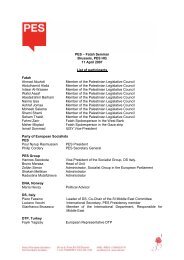Hedge funds and Private Equity - PES
Hedge funds and Private Equity - PES
Hedge funds and Private Equity - PES
You also want an ePaper? Increase the reach of your titles
YUMPU automatically turns print PDFs into web optimized ePapers that Google loves.
122<br />
Eircom case, Irel<strong>and</strong><br />
Eircom is the former national operator in Irel<strong>and</strong>, provider of fixed-line telecom services with<br />
approximately 2.2 million fixed-lines. When eircom was privatised by the government in 1998,<br />
it was relatively inefficient in terms of comparison to incumbent operators in leading countries<br />
in Europe, <strong>and</strong> in need of significant investment. The shares were purchased by a wide crosssection<br />
of Irish citizens. The Valentia private equity consortium acquisition in late 2001 was<br />
mostly debt financed. After the acquisition eircom repaid Valentia debt by issuing bonds<br />
which increased debt from about 25% to 70% of its capital structure.<br />
Eircom capital expenditures declined from E700m per annum in 2001 to 300m in 2002 <strong>and</strong><br />
200m in 2003 <strong>and</strong> 2004. In 2001 eircom invested its internally generated capital from depreciation<br />
allowances plus another E275m. Between 2002 <strong>and</strong> 2004, it invested more than<br />
E450m less than its internally generated capital from depreciation allowances. This enabled<br />
payment of a €400m dividend to Valentia.<br />
The second public stock offering was successfully floated in 2004 at a significant profit. And<br />
in 2006 <strong>Private</strong> <strong>Equity</strong> firm Babcock <strong>and</strong> Brown from Australia purchased eircom, again<br />
through debt finance. Eircom has now a debt ratio on the order of 117%. Although the new<br />
owners have announced their intention to invest in upgrading the eircom network to European<br />
broadb<strong>and</strong> st<strong>and</strong>ards, eircom’s capacity to invest significant amounts seems virtually straitjacketed.<br />
The new owners have petitioned the government to contribute <strong>funds</strong> to support<br />
universal service <strong>and</strong> indicated that pricing policies will need to be reviewed.<br />
Investments in long-term staff development, research <strong>and</strong> development, upgrading the quality of<br />
service <strong>and</strong> restoring public service obligations are all likely to be necessary to return infrastructure<br />
operations to a level of preparedness for long-term development. Infrastructure<br />
operators with significant monopoly power may have to seek higher prices from consumers to<br />
help finance the restoring of infrastructure operator st<strong>and</strong>ards. In the circumstances of the public<br />
utilities, the entry of the <strong>Private</strong> <strong>Equity</strong> Funds is unlikely to bring strategies for long-term investment<br />
in infrastructure development. Rather it is likely to bring strategies for disinvestment through<br />
massive cash payouts. These in turn can be expected to have significant negative multiplier<br />
effects on economic growth for the economies dependent on the continued development of<br />
these infrastructure services.<br />
3.4 Cases about Public Utility Sector: Telecommunication<br />
The telecommunication (telecom) sector has been most subject to privatisation of incumbent<br />
national operators. Most of the EU’s original 15 countries have privatised their national operators<br />
in whole or in part <strong>and</strong> are traded on public stock exchanges. The new EU member counties<br />
are at various stages of planning <strong>and</strong> implementing privatisation policies. The telecom sector is<br />
where there is the most actual experience with privatisation <strong>and</strong> where there have been a few<br />
instances of <strong>Private</strong> <strong>Equity</strong> takeovers.<br />
Telecom is also important because the sector is growing rapidly as a result of the convergence<br />
of computing <strong>and</strong> information technologies with telecom infrastructure technologies <strong>and</strong> services.<br />
Long-term investments in new upgraded broadb<strong>and</strong> telecom networks are now underway<br />
in order to provide the essential infrastructure for future Internet <strong>and</strong> electronic commerce services<br />
that will underpin Europe’s information society.




